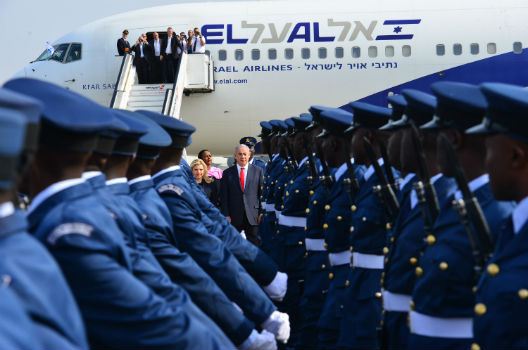 With increased partnership at the top of the agenda, a September meeting between Israeli Prime Minister Benjamin Netanyahu and over fifteen African heads of state at the margins of the United Nations General Assembly (UNGA) marks a critical point in Israel’s recent refocus on Africa. Conventional analysis on recent Israel-Africa relations suggests that Israel’s primary goal is to break up a traditionally anti-Israel voting bloc within the United Nations. However, current Israeli engagement with Africa goes beyond Israel’s short-term strategic interests. Deeper Israel-Africa ties are potentially a win-win situation, offering economic advancement and increased security cooperation for Israel and the continent alike.
With increased partnership at the top of the agenda, a September meeting between Israeli Prime Minister Benjamin Netanyahu and over fifteen African heads of state at the margins of the United Nations General Assembly (UNGA) marks a critical point in Israel’s recent refocus on Africa. Conventional analysis on recent Israel-Africa relations suggests that Israel’s primary goal is to break up a traditionally anti-Israel voting bloc within the United Nations. However, current Israeli engagement with Africa goes beyond Israel’s short-term strategic interests. Deeper Israel-Africa ties are potentially a win-win situation, offering economic advancement and increased security cooperation for Israel and the continent alike.
In the meeting, Netanyahu focused on common interests between Israel and the continent and proclaimed that “Africa is our top priority.” The meeting follows his July trip to Uganda, Kenya, Rwanda, and Ethiopia and the February launch of the Knesset Caucus for Israel-Africa Relations, an initiative focused on improving relations with the continent. These are just two events within the Netanyahu administration that mark a broader Israeli pivot to Africa, with the meeting further solidifying this trajectory.
Current Israel-Africa cooperation operates in three distinct ways:
These initiatives, many of them occurring within the past five years, signal Israel’s existing interest in the continent and show the benefits that increased cooperation can bring, especially to regions grappling with slowing economies, public health challenges, and the effects of climate change.
While not definitive of its pivot, Israel also has self-interested reasons for forming new relationships with African countries. The government’s refusal to adequately address the needs and legal status of over forty-five thousand African asylum seekers in the country, primarily from Eritrea and Sudan, stands in contrast to its attempts at friendship on the continent. One of Israel’s likely goals in this pivot is to create agreements, on top of its existing two, with African countries to host its unwanted migrants. Additionally, the country is seeking observer status within the African Union (AU) in order to cement its increased involvement in African affairs. It held observer status in the AU’s predecessor Organization of African Unity, but lost the position at the request of the late Libyan leader Muammar al-Qaddafi. Both Israel and Africa stand to gain if the former regains observer status with the AU: the AU provides an important forum for discussion, as well as an avenue for Israel to further engage with African countries and gain allies in international organizations.
A major road block to Israel’s expanding engagement with the continent and the question of observer status are the eleven African countries that do not recognize Israel. These are mostly Muslim-majority countries that either never had diplomatic relations with Israel or suspended them at various points. This, however, does not have to be the end-game to this development. Israel has made huge strides in the last thirty-five years in warming relations with Muslim-majority countries, including Egypt, Jordan, and Turkey. Meetings between Netanyahu, foreign ministry officials, and leaders from Somalia, Guinea, and Chad, for example, show that dialogue is possible and that every country in Africa, regardless of its religious makeup, can stand to benefit from a relationship with Israel.
In the future, it is likely that Israel-Africa cooperation will continue, not only in terms of agriculture and water issues, but also within the private sector and military support. Dialogue between Israeli leaders and leaders of different African countries should continue, and future trips by Israeli officials to Africa will open up conversation where it does not exist already. Sustained Israel-Africa engagement can lead to development on the continent and new cross-country learning initiatives, harnessing power in technology and startups, medicine, green energy, and counter-terror to generate cultural exchange and new sources of information for young African and Israeli experts alike. This has the possibility to create real, long-lasting friendships between African countries and Israel that go beyond single administrations and become engrained in national cultures.
Liviya David is an intern in the Africa Center.
Image: Israeli Prime MInister Netanyahu departs from Kenya en route to Rwanda in July, 2016 (Photo credit: Kobi Gideon / GPO)
